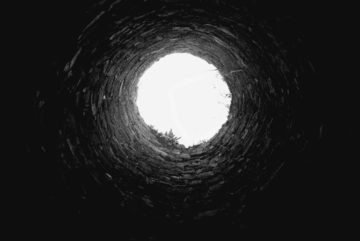by Deanna Kreisel (Doctor Waffle Blog)
 I had my first panic attack at age sixteen, which was (deargod) over 35 years ago. It happened during school, much to my teenage mortification. Some friends and I were hanging out in our high school newspaper office during a free period, sprawled on one of the crapped-out couches under the blinking fluorescent lights, just shooting the shit. All of a sudden, a wave of horror swept over me—no, that’s not the right word. It was a feeling of fear mixed with a kind of existential dread, washing over me in waves, and then my heart was pounding, the walls were closing in, and I was gripped with an intense feeling of unreality. (This is something that people with panic disorder don’t often explain—or maybe it’s different for everyone. But for me the worst part of a panic attack is the feeling that the world is unreal, that you’re trapped in some kind of cruel simulacrum and everything around you is fake. You yourself are fake.[i]) Apparently I was also gasping and sobbing, and saying over and over again “I want to go home. I want to go home.”
I had my first panic attack at age sixteen, which was (deargod) over 35 years ago. It happened during school, much to my teenage mortification. Some friends and I were hanging out in our high school newspaper office during a free period, sprawled on one of the crapped-out couches under the blinking fluorescent lights, just shooting the shit. All of a sudden, a wave of horror swept over me—no, that’s not the right word. It was a feeling of fear mixed with a kind of existential dread, washing over me in waves, and then my heart was pounding, the walls were closing in, and I was gripped with an intense feeling of unreality. (This is something that people with panic disorder don’t often explain—or maybe it’s different for everyone. But for me the worst part of a panic attack is the feeling that the world is unreal, that you’re trapped in some kind of cruel simulacrum and everything around you is fake. You yourself are fake.[i]) Apparently I was also gasping and sobbing, and saying over and over again “I want to go home. I want to go home.”
The next thing I remember clearly was my father carrying me out of the room in his arms. This part seems so incredible to me—How did he get there? Who called him? How long did it take? Why did he leave work in the middle of the day?—that I sometimes wonder if I’ve misremembered it or mixed it up with another memory. But I have corroborated this detail with semi-reliable sources, so I’m going to leave it here for the sake of my narrative. (I would do a lot for narrative.) The truly odd part is that once we got home, I didn’t stop saying “I want to go home” over and over again, even though my dad kept reassuring me that I was indeed home now. Clearly he was not on board with The Narrative, or he would have recognized a Metaphor when he saw one. Read more »
